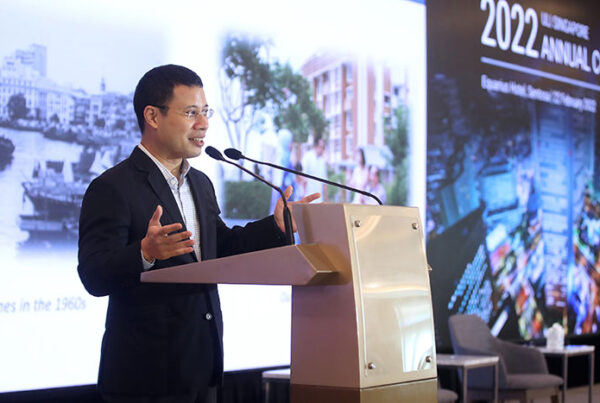Affordable and workforce housing policies and programs put in place by the governments of Alexandria, Virginia, and Minneapolis, Minnesota, have been selected as joint winners of the 2021 Urban Land Institute Robert C. Larson Housing Policy Leadership Awards. The annual awards, presented by the ULI Terwilliger Center for Housing, recognize innovative ways the public sector is addressing the nation’s affordable housing crisis, and the winners will be celebrated at the ULI Fall Meeting in Chicago (October 11–14).
“The calibre of the entries for the Larson Awards was extremely high this year,” said ULI Terwilliger Center for Housing executive director Christopher Ptomey. “Congratulations to the winners, whose initiatives will substantially improve housing access for lower-income residents and advance the cities’ equitable development priorities. Other cities can learn from, and replicate, these forward-thinking strategies and we look forward to honoring them at ULI’s Fall Meeting.”
This year’s winners included:
- Alexandria, Virginia, Office of Housing and Department of Planning and Zoning. In 2019, Alexandria amended its zoning ordinance as a result of a comprehensive and culturally inclusive community planning and engagement process. The residential multifamily (RMF) zone provides a substantial density incentive to induce landowners to preserve or produce affordable housing. The RMF zone was developed pursuant to the 2018 South Patrick Street Housing Affordability Strategy, a community planning process undertaken to identify potential tools, strategies, and resources for the preservation of 215 existing units of deeply affordable housing at risk of being lost to market pressures. The RMF zone allows substantial new density so the owner can develop three to five market-rate units to subsidize every deeply affordable unit provided. In addition, the zone requires assistance and protections for existing residents who are temporarily relocated—including a right to return when the new development is complete—so that redevelopment can occur.
- Minneapolis Community Planning and Economic Development Department. Minneapolis Homes was created in response to a City Council directive in 2015 to incentivize housing development on city-owned vacant land. The program began with four strategies: 1) provide a homebuyer incentive to build new homes on vacant lots; 2) promote mixed-income neighborhoods throughout Minneapolis by creating a long-term affordability homebuyer financing tool; 3) build new homes on city-owned vacant lots by providing value gap development assistance; and 4) invest land-sale proceeds to further program goals. To meet city climate goals, sustainable building requirements and incentives were added for Minneapolis Homes–funded projects. Minneapolis Homes was originally a single-family new construction program; now the program provides funding for one- to 20-unit construction in alignment of 2040 Comprehensive Plan goals. And finally, in 2020, the program introduced funding targeting a reduction in displacement.
The Larson Awards recognize exemplary state and local programs, policies, and practices that support the production, rehabilitation, or preservation of workforce and affordable housing. The program was created in 2011 to honor the legacy of the late Robert C. Larson, a former ULI Foundation chairman and a longtime ULI trustee.
The program recognizes states and localities that undertake a broad range of policy and administrative initiatives to support housing affordability. They can take the form of regulatory or administrative changes such as allowing higher densities and waiving fees, or programs that provide grants or financing assistance. Policy programs are judged on a variety of factors, including impact on the supply of workforce housing, comprehensiveness of the tools and programs employed, involvement of public/private partnerships, and the ability to leverage private and nonprofit funds, among other criteria.
The jury is chaired by Ron Terwilliger, founder of the ULI Terwilliger Center and chairman of Terwilliger Pappas Multifamily Partners. Other jury members are Payton Chung, managing partner, Westover Green, Washington, D.C.; Dennis Daniels, architect and project manager, Wier Boerner Allin Architecture, Nashville; Adam Ducker, chief executive officer, RCLCO, Bethesda, Maryland; Mike Francescani, manager, CohnReznick, Boston; Alan George, executive vice president (retired), Equity Residential, Chicago; Sonia Huntley, senior vice president of diversity, equity, and inclusion, ULI, Washington, D.C.; Dara Kovel, president, Beacon Communities, Boston; Dionne Nelson, principal and chief executive officer, Laurel Street Residential, Charlotte; Phillip Payne, co-founder and chairman, the Lotus Campaign, Charlotte; Mark Richardson, chief technology officer, Rich Analytics, Toronto; Stacy Silber, principal, LerchEarlyBrewer, Bethesda, Maryland; Jaydan Tait, president and chief executive officer, Attainable Homes Calgary, Calgary, Alberta; Emily Thompson, partner, GMD Development, Seattle; Sam Watkins, director of architecture, BKV Group, Dallas; and Margaret Wylde, chief executive officer, ProMatura Group, Oxford, Mississippi.


